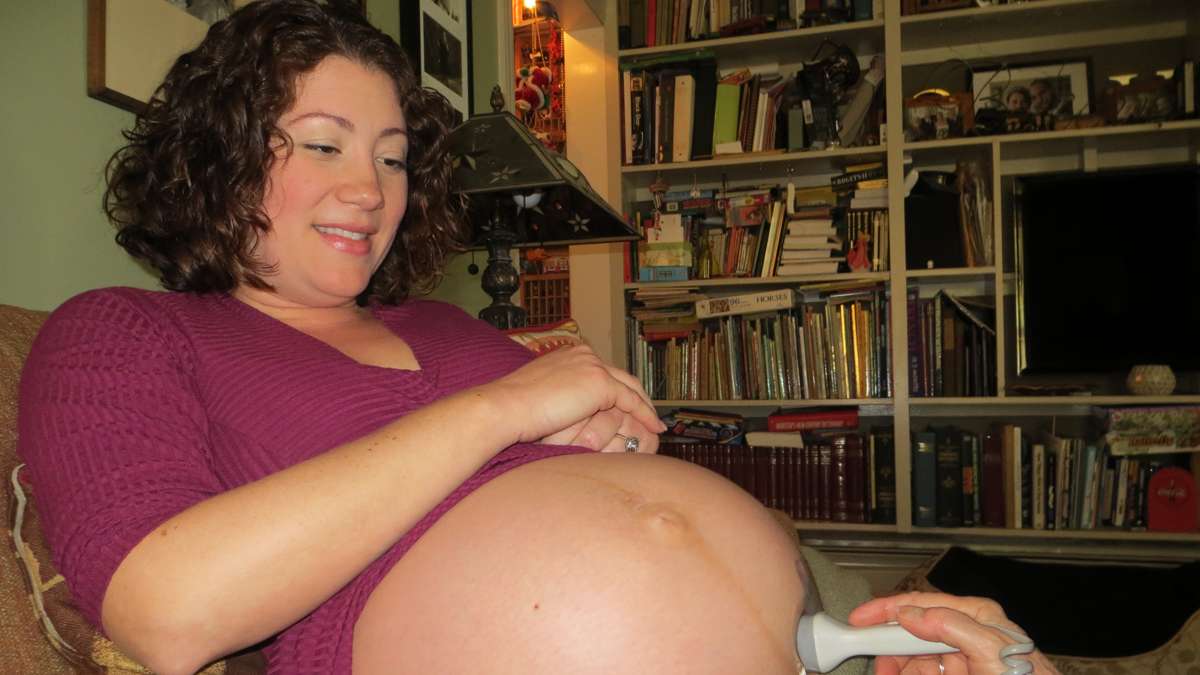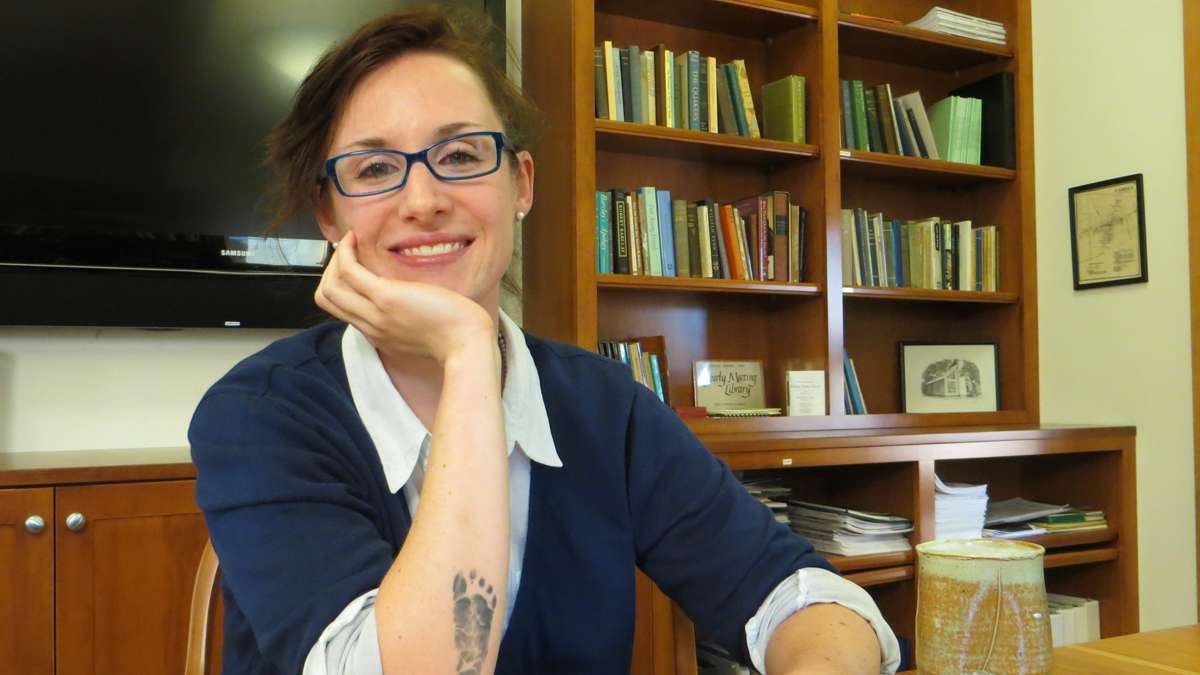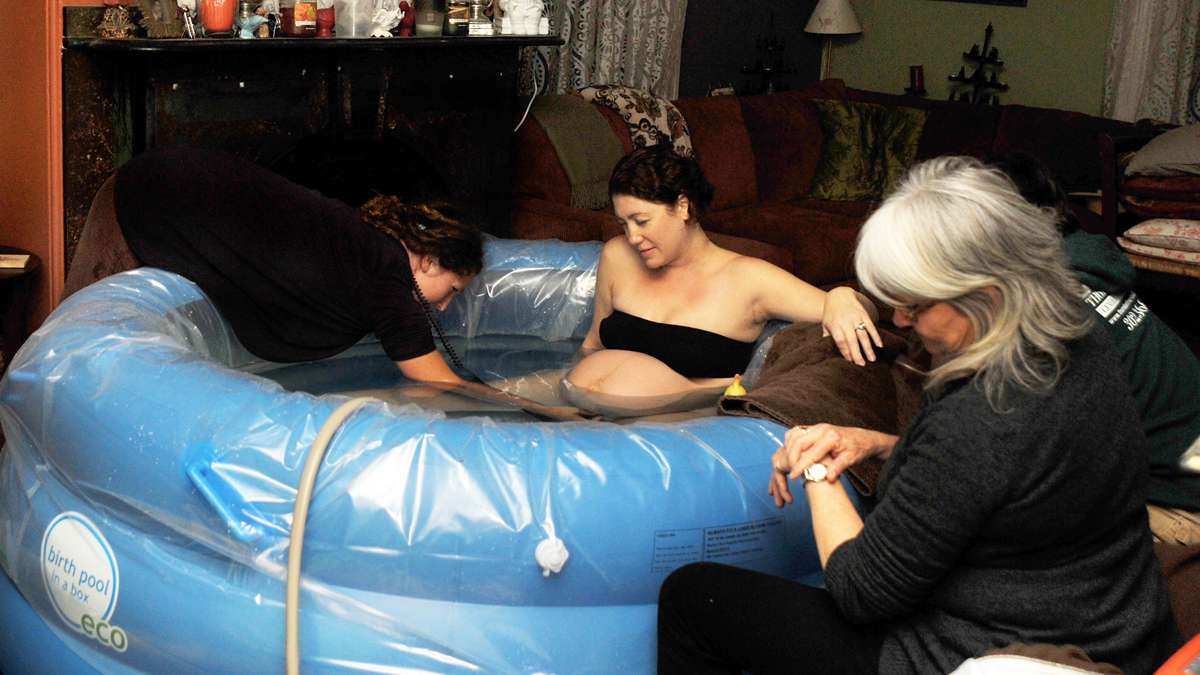Stepped up sanctions for home birth in Delaware have expecting moms adjusting plans
ListenPregnant and considering a home birth? New regulations in Delaware have some women willing to cross state lines to deliver how—and where—they want.
Also included in this series: Is home birth safe?
Less than one percent of babies in the United States are born at home, but there’s a revival. And as that choice has become more popular, Delaware health officials are paying more attention to the professionals who help women deliver at home.
This summer, Delaware state law changed for one particular kind of birth attendant: Delaware calls them non-nurse midwives. Non-nurse midwives working without a permit in Delaware now face stiffer penalties, including possible jail time.
In June, during a hearing on House Bill 194 in the General Assembly, director of the Division of Public Health Karyl Rattay spoke with lawmakers: “Really what this bill does is it levels the penalties for people practicing midwifery outside the scope of the law with other professionals who would practice medicine without a license.”
State health officials declined an interview with WHYY/NewsWorks, but say they have documented three “bad outcomes” involving a home birth and a non-nurse midwife.
“What remedy does this family have? They can’t take action against the midwife because they are not licensed,” said State Rep. Rebecca Walker (D), who supports the change. “There are these rules that need to be followed and they haven’t been followed for a long time.”
The stepped-up sanctions have had a chilling effect: When punishments increased, some midwives— who don’t have a permit — decided to stop attending home births in Delaware.
“The end result is that there will probably be a lot of people out there having unassisted home births or free births or do it yourself home births—whatever you want to call it,” said non-nurse midwife Susan DiNatale. “That’s a disaster waiting to happen and the state of Delaware needs to recognize that they need to wake up and fix this problem.”
While Delaware uses the title non-nurse midwife, DiNatale and others prefer the term “certified professional midwife.”
Just one certified professional midwife in Delaware has a permit—and the state’s approval–to work, and her practice is limited to women within the Mennonite and Amish communities. Opponents argue that Delaware families now have severely limited options if they want a home birth and are looking for help.
Dinatale has a certification from a national board, but she does not have a permit to practice in Delaware. In May, that state issued a “cease and desist order” against her.
For years certified professional midwives went about their business—attending clients and home births in Delaware—without a permit and without much concern.
“The state board of health and the physician community has sort of looked the other way when it comes to home birth midwifery, it sort of wasn’t on their radar,” said Sarah Culver who’s a doula and part of the home birth advocacy group Families for Safe Birth.
Now though, health officials and lawmakers have “tuned in to” the underground home birth community and decided to take action, she said.
“That drastic action was to make our professional midwives—who are trained, educated and credentialed—felons,” Culver said.
Why no permit?
To apply for a permit, a non-nurse midwife needs something called a collaborative agreement. It’s a contract with a Delaware obstetrician who agrees to be a back-up doctor, kind of like a sponsor.
“The problem with a written practice agreement is that there is implied liability,” said Karen Webster, a midwife in Maryland. “Malpractice insurance companies will drop doctors from their malpractice policy, if they know they are collaborating formally.”
Webster launched her midwifery practice, WomanWise, 26 years ago from her home in Elkton, Md., just across the Delaware state line. The home office is decorated with totems to female fertility and bumper stickers such as “Midwives help people out.” Pictures of newborns and new moms cover an entire wall.
There’s a long-standing tug of war for trust and autonomy between some midwives and some doctors in Delaware.
“They don’t know who we are. We are not familiar to them. We’re not witches. We don’t all wear Birkenstocks and not shave our legs, and who cares about that. That’s not what it’s about,” Webster said.
She and her clients work out a contingency plan that includes going to the hospital if an emergency happens, and Webster said she urges women to establish their own doctor-patient relationship with an obstetrician.
“We are all about fostering good relationships with the medical community,” Webster said. “However, once you tie it to a formal practice agreement, it doesn’t work.”
Community comment
The push for H.B. 194 and tougher punishment for certified professional midwives working without a permit started this summer. “Yes” vote after “yes” vote came quickly in the General Assembly, but there was more debate and discussion online and at community meetings.
In September—after the bill passed–Delaware gathered residents to discuss ways to keep the home birth option viable for Delaware women and ways to get non-nurse midwives back to work. Still, no one expressed much hope for brokering a successful collaborative agreement between a Delaware doctor and midwife—who’s not a nurse.
Nancy Fan, an obstetrician gynecologist at St. Francis Hospital, was at the meeting.
“Everybody in the 21st Century in the United States feels like they should have a healthy baby, it doesn’t always work out that way,” Fan said. “Obstetricians make money. Unfortunately any type of lawsuit, when it comes down to what went wrong and who can we blame? They are going to go for someone who makes some money.”
Fan works with and says she trusts the training of midwives who are registered nurses, but said she has very little experience with non-nurse midwives.
“I think there’s a lot of concern–on our side–on the kind of care that’s being offered,” Fan said.
“There’s no way to predict when something that’s perfectly natural and normal can turn into something that’s completely disastrous to both the mom and the baby,” said Wilmington physician Richard Henderson, district chair of the American Congress of Obstetricians and Gynecologists.
He said birth risks—at home or the hospital—include post-partum hemorrhage, which requires swift action and he wonders if a midwife who’s not a registered nurse has the training to recognize those issues.
Henderson said he suspects there are many healthy deliveries happening at home in Delaware, but they are not counted in the statistics because non-nurse midwives are working outside the law.
“We unfortunately see the sad stories the poor outcomes of home births that didn’t go well,” Henderson said.
28-year Sarah Stahre from Delmar, Del., was 22 weeks pregnant when she stepped up to the microphone to say she’s planning a home birth.
“I’m really pissed off—sorry, Mom–at everybody that has taken away my right to have a professional midwife there,” Stahre said.
Looking for a way forward, some people have suggested that Delaware establish a board of midwifery to oversee the profession, instead of expecting each individual certified professional midwife to find and broker an agreement with a physician.
Rep. Rebecca Walker, who is also a registered nurse, said setting up a board and establishing regulations for perhaps three non-nurse midwives doesn’t make sense.
“There is an oversight system already in place. I don’t think there’s enough licensees to get to the point where they need a board,” Walker said. “I don’t think it’s fiscally responsible from a state’s perspective.”
Delaware’s board of nursing includes more than 18,000 licensees. It’s not clear how many non-nurse midwives are working in the state.
Midwife on trial
Maryland midwife Karen Webster says she no longer helps with deliveries in Delaware, but she was in a Delaware home back in 2011, when a client delivered a stillborn baby. She won’t comment on the details of that client’s loss, but said “We can’t control everything, even in the hospital. You have to understand these things happen frequently in the hospital as well.”
Delaware has charged Webster with practicing medicine without a license, and in May the state board of medical licensure and discipline issued a cease and desist order against her.
Under the 2013 law, Webster might face jail time, but her case began earlier, so she’s facing a fine.
“We don’t practice nursing, we’re not trained to take care of sick people, our education is in taking care of normal healthy women and that’s what we are experts in,” Webster said. She’s fighting Delaware’s charges in court and trying to set a precedent based on her belief that midwifery is not medicine.
Hers is a belief that’s at odd’s with Delaware’s definition of medicine which includes “the management of pregnancy and parturition.”
Seeking a home delivery
Home birth remains an uncommon choice among American women, but between 2004 and 2009 the number increased by 29 percent, according to the Centers for Disease Control and Prevention.
Purusha Rivera, from Bear, Del., gave birth to her first two children in a hospital operating room.
“I had lots of IVs. I had oxygen. I also had an epidural. I wasn’t pushing effectively,” Rivera said. “All of that along with a lot of the research that I did, is what made me make the decision to find a midwife and have a home birth.”
“I knew I didn’t want to be strapped down to a bed. I wanted to be up moving, I wanted it to be as natural as possible, I wanted to have as much support as I can to get through this,” Rivera said.
Rivera, 36, works in the medical field as an ultrasound technician but chose midwife Karen Webster for her own delivery.
“Doctors do amazing things, I work with a group of them, I respect every one, but for a low risk mother, who desires a natural birth, this should be available,” Rivera said.
Rivera was halfway through her pregnancy when the punishment increased for midwives working without a permit. Webster decided that, professionally, it was too risky to travel to Delaware to assist, so Rivera had to make a new plan.
“We had to find another home, outside of Delaware, for us to deliver,” she said.
Turns out Rivera did have a home birth. She delivered a healthy, 10-pound baby boy in Karen Webster’s living room in Elkton, Md.
Extra links
WHYY is your source for fact-based, in-depth journalism and information. As a nonprofit organization, we rely on financial support from readers like you. Please give today.







